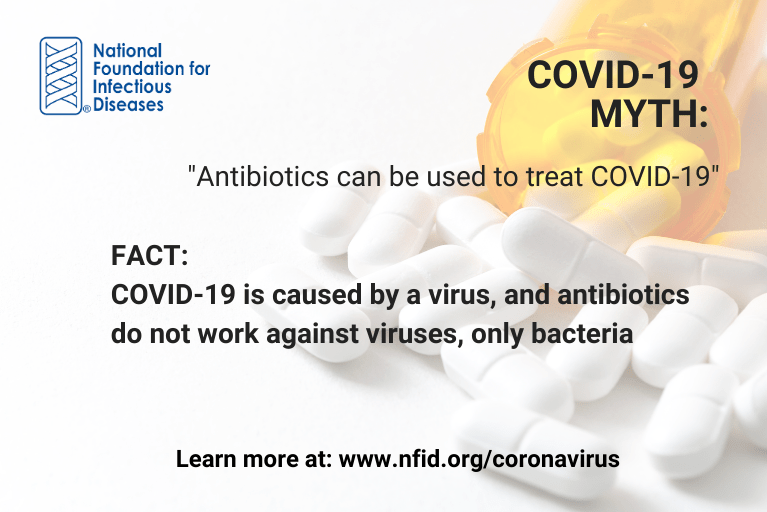

Each year in the US, more than 2.8 million antibiotic-resistant infections occur, and more than 35,000 people die as a result. Up to 50 percent of all antibiotics prescribed are not prescribed appropriately or are not needed at all. The National Foundation for Infectious Diseases (NFID) is joining the Centers for Disease Control and Prevention (CDC) as a partner to share 7 key facts that you should know about antibiotics:
1. Antibiotics can save lives. When used appropriately, antibiotics work remarkably well and fast. The benefits outweigh potential side effects or the risk of resistance.
2. Antibiotics are not always the answer. Some patients may appear to benefit from antibiotics, when, in fact, their persistent cough/cold would have gone away in about the same amount of time even without antibiotics.
3. Antibiotics do not work on viruses. Antibiotics are not effective against influenza (flu), coronaviruses, or other viruses that cause colds, bronchitis, or runny noses, even if the mucus is thick, yellow, or green.
4. Antibiotics only work against bacteria but not all bacterial infections need to be treated with antibiotics. Some bacterial infections, including many sinus infections and some ear infections, will resolve without antibiotics.
5. Antibiotics will not make you feel better if you have a virus. Respiratory viruses usually go away in a week or two without medication. Talk to a healthcare professional about things you can do to feel better, like drinking plenty of liquids, getting enough sleep, and staying home to rest.
6. If you do need antibiotics, take them exactly as prescribed. Talk to a healthcare professional if you have any questions or if you develop side effects, especially diarrhea since that could be caused by Clostridioides difficile (C. difficile), which needs to be treated.
7. Antibiotics are critical tools for treating life-threatening conditions, including sepsis and certain types of pneumonia. This makes it all the more important to use antibiotics appropriately.
The human body is full of bacteria, so when you take an antibiotic, the “good” bacteria in your gut may become more resistant to that antibiotic. Some people will not experience consequences from this, but others may develop subsequent resistant infections or pass resistant bugs on to family members. Antibiotic stewardship helps to keep people healthy, prevent drug-resistance, and ensure that life-saving antibiotics will work for future generations.
more recommended stories
 Pediatric Crohn’s Disease Microbial Signature Identified
Pediatric Crohn’s Disease Microbial Signature IdentifiedKey Points at a Glance NYU.
 High-Fat Diets Cause Damage to Metabolic Health
High-Fat Diets Cause Damage to Metabolic HealthKey Points Takeaways High-fat and ketogenic.
 Can Too Many Antioxidants Harm Future Offspring?
Can Too Many Antioxidants Harm Future Offspring?Key Takeaways High-dose antioxidant supplementation in.
 Human Antibody Drug Response Prediction Gets an Upgrade
Human Antibody Drug Response Prediction Gets an UpgradeKey Takeaways A new humanized antibody.
 Dietary Melatonin Linked to Depression Risk: New Study
Dietary Melatonin Linked to Depression Risk: New StudyKey Summary Cross-sectional analysis of 8,320.
 Type 2 Diabetes Risk Identified by Blood Metabolites
Type 2 Diabetes Risk Identified by Blood MetabolitesKey Takeaways (Quick Summary) Researchers identified.
 Microglia Neuroinflammation in Binge Drinking
Microglia Neuroinflammation in Binge DrinkingKey Takeaways (Quick Summary for HCPs).
 Durvalumab in Small Cell Lung Cancer: Survival vs Cost
Durvalumab in Small Cell Lung Cancer: Survival vs CostKey Points at a Glance Durvalumab.
 Rising Chagas Parasite Detected in Borderland Kissing Bugs
Rising Chagas Parasite Detected in Borderland Kissing BugsKey Takeaways (At a Glance) Infection.
 Can Ketogenic Diets Help PCOS? Meta-Analysis Insights
Can Ketogenic Diets Help PCOS? Meta-Analysis InsightsKey Takeaways (Quick Summary) A Clinical.

Leave a Comment